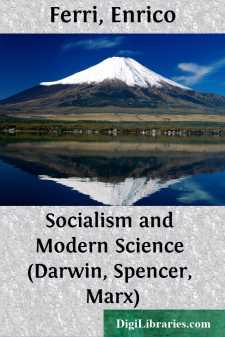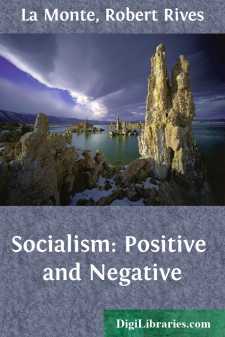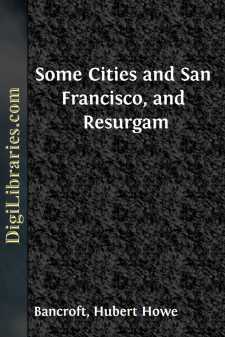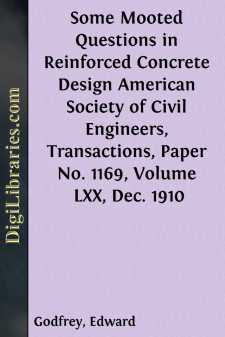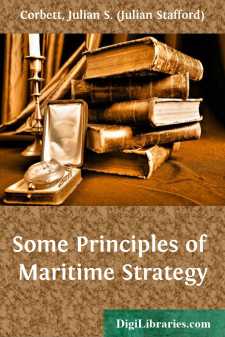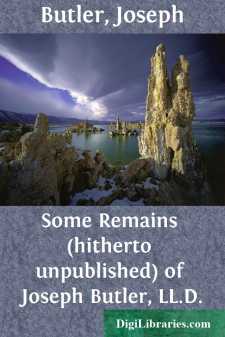Non-Classifiable
- Non-Classifiable 1768
Non-Classifiable Books
Sort by:
by:
Enrico Ferri
I. VIRCHOW AND HAECKEL AT THE CONGRESS OF MUNICH. On the 18th of September, 1877, Ernest Haeckel, the celebrated embryologist of Jena, delivered at the Congress of Naturalists, which was held at Munich, an eloquent address defending and propagating Darwinism, which was at that time the object of the most bitter polemical attacks. A few days afterward, Virchow, the great pathologist,—an active member...
more...
The only Socialism of interest to practical persons is the Socialism of the organized Socialist movement. Yet the public cannot be expected to believe what an organization says about its own character or aims. It is to be rightly understood only through its acts. Fortunately the Socialists' acts are articulate; every party decision of practical importance has been reached after long and earnest...
more...
Until the middle of this (the nineteenth) century the favorite theory with those who attempted to explain the phenomena of History was the Great-Man-Theory. This theory was that once in a while through infinite mercy a great man was sent to the earth who yanked humanity up a notch or two higher, and then we went along in a humdrum way on that level, or even sank back till another great man was...
more...
I. NOTES ON THE FUNCTION OF METAPHOR The business of the writer is to arouse in the mind of his reader the fullest possible consciousness of the ideas or emotion that he is expressing. To this end he suggests a comparison between it and something else which is similar to it in respect of those qualities to which he desires to draw attention. The reader's mind at once gets to work unconsciously on...
more...
SOME CITIES AND SAN FRANCISCO There had been some discussion as to improving and beautifying the city of San Francisco prior to the catastrophe of April 18th. Landscape architects had been consulted, proposals considered, and preliminary plans drawn. Therefore when on that day the city was swept by fire, obviously it was the opportune moment for the requisite changes in the rebuilding. For a brief...
more...
THE EARLY LITURGICAL DRAMA The modern entertainment called opera is a child of the Roman Catholic Church. What might be described as operatic tendencies in the music of worship date further back than the foundation of Christianity. The Egyptians were accustomed to sing "jubilations" to their gods, and these consisted of florid cadences on prolonged vowel sounds. The Greeks caroled on vowels in...
more...
by:
Edward Godfrey
With Discussion by Messrs. Joseph Wright, S. Bent Russell, J.R. Worcester, L.J. Mensch, Walter W. Clifford, J.C. Meem, George H. Myers, Edwin Thacher, C.A.P. Turner, Paul Chapman, E.P. Goodrich, Albin H. Beyer, John C. Ostrup, Harry F. Porter, John Stephen Sewell, Sanford E. Thompson, and Edward Godfrey. Not many years ago physicians had certain rules and practices by which they were guided as to when...
more...
Nothing in the progress of human knowledge is more remarkable than the recent discoveries in American archæology, whether we regard them as monuments of art or as contributions to science. The names of Stephens and Norman will ever stand preëminent for their extraordinary revelations in Mexico and Yucatan; which, added to those previously made by Del Rio, Humboldt, Waldeck and D’Orbigny in these...
more...
INTRODUCTION The Theoretical Study of War—Its Use andLimitations At first sight nothing can appear more unpractical, less promising of useful result, than to approach the study of war with a theory. There seems indeed to be something essentially antagonistic between the habit of mind that seeks theoretical guidance and that which makes for the successful conduct of war. The conduct of war is so much...
more...
by:
Joseph Butler
PREFACE. It has long been a subject of regret that we should have so few remains of so great a writer as the author of the “Analogy,” not only the greatest thinker of his day, but one almost equally remarkable for his personal religion and amiability. The few fragments and letters which remain unpublished, derive from this circumstance a value wholly incommensurate with their extent, though, as to...
more...


